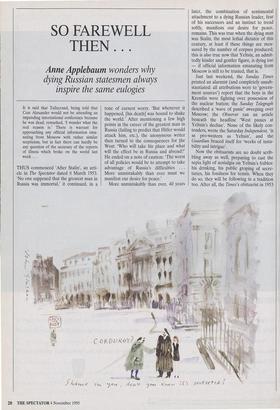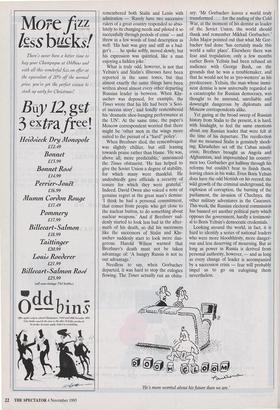SO FAREWELL
THEN...
Anne Applebaum wonders why
dying Russian statesmen always inspire the same eulogies
It is said that Talleyrand, being told that Czar Alexander would not be attending an impending international conference because he was dead, remarked, 'I wonder what the real reason is.' There is warrant for approaching any official information ema- nating from Moscow with rather similar scepticism, but in fact there can hardly be any question of the accuracy of the reports of illness which broke on the world last week ...
THUS commenced 'After Stalin', an arti- cle in The Spectator dated 6 March 1953. `No one supposed that the greatest man in Russia was immortal,' it continued, in a tone of earnest worry. 'But whenever it happened, [his death] was bound to shake the world.' After mentioning a few high points in the career of the greatest man in Russia (failing to predict that Hitler would attack him, etc.), the anonymous writer then turned to the consequences for the West: 'Who will take his place and what will the effect be in Russia and abroad?' He ended on a note of caution: 'The worst of all policies would be to attempt to take advantage of Russia's difficulties . More unmistakably than ever must we manifest our desire for peace.'
More unmistakably than ever, 40 years later, the combination of sentimental attachment to a dying Russian leader, fear of his successors and an instinct to tread softly, manifests our desire for peace, remains. This was true when the dying man was Stalin, the most lethal dictator of this century, at least if these things are mea- sured by the number of corpses produced; this is also true now that Yeltsin, an admit- tedly kinder and gentler figure, is dying too — if official information emanating from Moscow is still to be trusted, that is.
Just last weekend, the Sunday Times printed an alarmist (and completely unsub- stantiated: all attributions were to 'govern- ment sources') report that the boys in the Kremlin were fighting over possession of the nuclear button; the Sunday Telegraph described a 'wave of panic' sweeping over Moscow; the Observer ran an article beneath the headline 'West panics at Yeltsin's decline'. None of the likely con- tenders, wrote the Saturday Independent, 'is as pro-western as Yeltsin', and the Guardian braced itself for 'weeks of insta- bility and intrigue'.
Now the obituarists are no doubt scrib- bling away as well, preparing to cast the sepia light of nostalgia on Yeltsin's foibles: his drinking, his public groping of secre- taries, his fondness for tennis. When they do so, they will be following in a tradition too. After all, the Times's obituarist in 1953 remembered both Stalin and Lenin with admiration — 'Rarely have two successive rulers of a great country responded so abso- lutely to its changing needs and piloted it so successfully through periods of crisis' — and threw in a few words of fond description as well: 'His hair was grey and stiff as a bad- ger's . he spoke softly, moved slowly, but his expression was quizzical, like a man enjoying a hidden joke.'
What is truly odd, however, is not that Yeltsin's and Stalin's illnesses have been reported in the same tones, but that almost exactly the same things have been written about almost every other departing Russian leader in between. When Khr- uschev was deposed, for example, the Times wrote that his life had been 'a Sovi- et success story', and fondly remembered his 'dramatic shoe-banging performance at the UN'. At the same time, the paper's Moscow correspondent worried that there might be 'other men in the wings more suited to the pursuit of a "hard" policy'.
When Brezhnev died, the remembrance was slightly chillier, but still leaning towards praise rather than blame. 'He was, above all, more predictable,' announced the Times obituarist. 'He has helped to give the Soviet Union a degree of stability, for which many were thankful. He undoubtedly gave officials a security of tenure for which they were grateful.' Indeed. David Owen also voiced a note of genuine regret at the great man's demise: `I think he had a personal commitment, that comes from people who get close to the nuclear button, to do something about nuclear weapons.' And if Brezhnev sud- denly started to look less bad in the after- math of his death, so did his successors like the successors of Stalin and Khr- uschev suddenly start to look more dan- gerous. Harold Wilson warned that Brezhnev's death must not be taken advantage of: 'A hungry Russia is not to our advantage.'
Needless to say, when Gorbachev departed, it was hard to stop the eulogies flowing. The Times actually ran an obitu- ary: `Mr Gorbachev leaves a world truly transformed . . for the ending of the Cold War, at the moment of his demise as leader of the Soviet Union, the world should thank and remember Mikhail Gorbachev.' John Major pointed out that what Mr Gor- bachev had done 'has certainly made this world a safer place'. Elsewhere there was fear and trepidation; only a few months earlier Boris Yeltsin had been refused an audience with George Bush, on the grounds that he was a troublemaker, and that he would not be as 'pro-western' as his predecessor. Yeltsin, the man whose immi- nent demise is now universally regarded as a catastrophe for Russian democracy, was thought to be unsound, unreliable and downright dangerous by diplomats and Moscow correspondents alike.
Yet gazing at the broad sweep of Russian history from Stalin to the present, it is hard, with hindsight, to feel the same emotions about any Russian leader that were felt at the time of his departure. The recollection that we mourned Stalin is genuinely shock- ing; Khrushchev set off the Cuban missile crisis; Brezhnev brought us Angola and Afghanistan, and impoverished his country- men too. Gorbachev got halfway through his reforms but couldn't bear to finish them, leaving chaos in his wake. Even Boris Yeltsin does have the odd blemish on his record: the wild growth of the criminal underground, the explosion of corruption, the burning of the parliament, the invasion of Chechnya, the other military adventures in the Caucuses. This week, the Russian electoral commission has banned yet another political party which opposes the government, hardly a testimoni- al to Boris Yeltsin's democratic credentials.
Looking around the world, in fact, it is hard to identify a series of national leaders who were more bloodthirsty, more danger- ous and less deserving of mourning. But as long as power in Russia is derived from personal authority, however, — and as long as every change of leader is accompanied by a succession crisis — fear will probably impel us to go on eulogising them nevertheless.
'He's more worried about his future than we are.'











































































 Previous page
Previous page